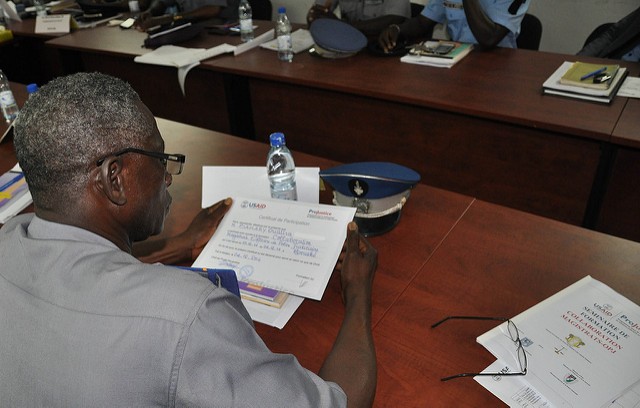Home » News & Information » Fact Sheets » Improving cooperation between Ivoirian magistrates and judicial police

A police officer in Bouake receives his certificate after completing his training on interacting with the court system
Micah Clemens, USAID Côte d'Ivoire
With the support of USAID, the Ivoirian Government is making significant strides rebuilding the rule of law and restoring public confidence in the justice sector after years of unrest and stagnation. In particular, the USAID-funded Justice Sector Support Program (“ProJustice”) is carrying out intensive capacity building activities such as nationwide joint trainings of prosecutors, investigating judges, and judicial police officers (JPOs). The result has been improved communication, cooperation, and effectiveness of investigations, prosecutions, and court cases.
"The joint training provided by ProJustice was very beneficial for both the magistrates and JPOs of the Dimbokro jurisdiction. This training was practical and concrete, and the interactive workshops allowed rich exchanges between participants,” said Jean Brou, local prosecutor at the Court Section of Dimbokro, one of USAID’s 11 pilot courts (see photo).
Eschewing the theoretical for the practical, the workshops led to concrete protocols for communication and cooperation between prosecutors and JPOs during the preliminary investigation. Participants also assigned respective responsibilities regarding custody of suspects. With an eye toward sustainability, Ivoirian magistrates and JPOs identified and trained by USAID led the trainings with support from the Ministry of Justice.
“The collaborative approach taught at ProJustice’s training is now implemented on a daily basis in our jurisdiction,” declared Jean Brou.
USAID’s Pilot Court Coordinator in Dimbokro, Luc Bahou, reports that since the training, the local prosecutor now calls the JPO units every morning to monitor in real time all pending cases. In their turn, the JPOs also regularly report to the prosecutor and ask for instructions on how to proceed with pending investigations. The newly trained justice officials also closely monitor suspects in custody to ensure that legislation is followed, in particular time limits. According to Luc Bahou, the JPOs are showing a renewed commitment to their responsibilities, taking great pride in improving the delivery of justice in their jurisdiction.







Comment
Make a general inquiry or suggest an improvement.